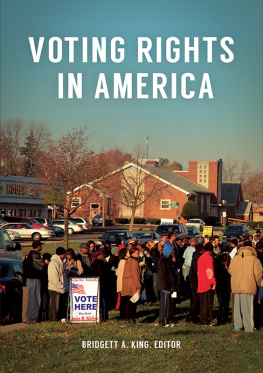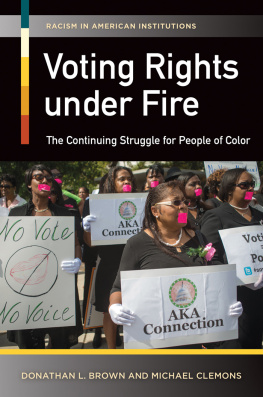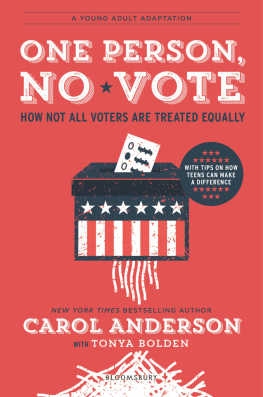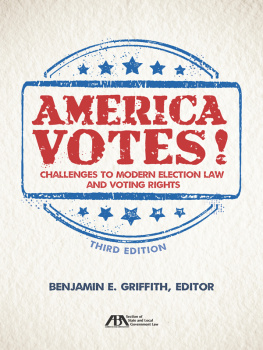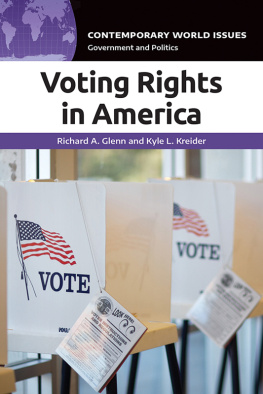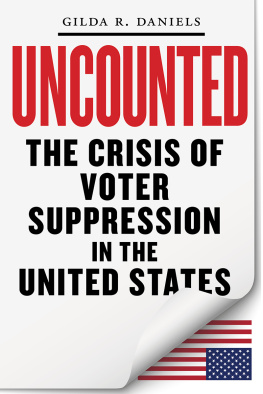Voting Rights in America
Voting Rights in America
Primary Documents in Context
Bridgett A. King, Editor

Copyright 2020 by ABC-CLIO, LLC
All rights reserved. No part of this publication may be reproduced, stored in a retrieval system, or transmitted, in any form or by any means, electronic, mechanical, photocopying, recording, or otherwise, except for the inclusion of brief quotations in a review, without prior permission in writing from the publisher.
Library of Congress Cataloging-in-Publication Data
Names: King, Bridgett A., editor.
Title: Voting rights in America : primary documents in context / Bridgett A. King, editor.
Description: First edition. | Santa Barbara, California : ABC-CLIO, [2020] | Includes bibliographical references and index.
Identifiers: LCCN 2019026665 (print) | LCCN 2019026666 (ebook) | ISBN 9781440871542 (hardcover) | ISBN 9781440871559 (ebook)
Subjects: LCSH: SuffrageUnited StatesHistorySources.
Classification: LCC KF4891 .V68 2020 (print) | LCC KF4891 (ebook) | DDC 342.73/072dc23
LC record available at https://lccn.loc.gov/2019026665
LC ebook record available at https://lccn.loc.gov/2019026666
ISBN: 978-1-4408-7154-2 (print)
978-1-4408-7155-9 (ebook)
242322212012345
This book is also available as an eBook.
ABC-CLIO
An Imprint of ABC-CLIO, LLC
ABC-CLIO, LLC
147 Castilian Drive
Santa Barbara, California 93117
www.abc-clio.com
This book is printed on acid-free paper 
Manufactured in the United States of America
Every reasonable effort has been made to trace the owners of copyright materials in this book, but in some instances this has proven impossible. The editor and publisher will be glad to receive information leading to more complete acknowledgments in subsequent printings of the book and in the meantime extend their apologies for any omissions.
Contents
If there is one sacred feature of the American democracy, it is the right to vote.
Twiley W. Barker Jr. and Lucious J. Barker (1987)
Historically, the United States has excluded certain segments of the population from the voting process: women, racial and ethnic minorities, non-property owners, the poor, citizens with felony convictions, and members of certain faiths. Over the course of many decades, however, the franchise was extended to most of these groups, albeit only after years of struggle. As access expanded and the administrative structure surrounding the right to vote evolved, consideration was given to the procedures that structure voting and registration and how they might limit participation for groups, including the poor, racial and ethnic minorities, military, citizens who live overseas, the homeless, and those with disabilities. For each of these groups, securing the right to vote was won through the collective action of citizen groups who often turned to the Federal Courts and Congress to secure voting rights. Although great strides have been made, and we often think of the fight for the right to vote as a settled part of history in the United States, controversies, challenges, and barriers still remain to ensure that all eligible citizens have access to the franchise and are able to vote freely and fairly.
At the founding of the nation, the founding fathers were very much aware of the power of the vote and the way it could be used by citizens to shape governance. The decision to exclude certain groupsnotably people of African descent (both free and slave), women, and the poorfrom the franchise was rooted in the idea that there should be requisite qualifications for voting. Many of these stipulations were established by the colonies and through British tradition. Although there were those who believed that by founding the new nation there was an opportunity to create a more inclusive republic that did not limit voting to white men who owned property, arguments for the exclusion of blacks, women, and the poor persisted. In a 1776 correspondence with James Sullivan, John Adams (who would go on to become the nations second president) explained his reasons for supporting the exclusion of women and the poor for the franchise:
It is certain in Theory, that the only moral Foundation of Government is the Consent of the People. But to what an Extent Shall We carry this Principle? Shall We Say, that every Individual of the Community, old and young, male and female, as well as rich and poor, must consent, expressly to every Act of Legislation? No, you will Say. This is impossible. How then does the Right arise in the Majority to govern the Minority, against their Will? Whence arises the Right of the Men to govern Women, without their Consent? Whence the Right of the old to bind the Young, without theirs...
But why exclude Women? You will Say, because their Delicacy renders them unfit for Practice and Experience, in the great Business of Life, and the hardy Enterprizes of War, as well as the arduous Cares of State. Besides, their attention is So much engaged with the necessary Nurture of their Children, that Nature has made them fittest for domestic Cares. And Children have not Judgment or Will of their own...
Depend upon it, sir, it is dangerous to open So fruitfull a Source of Controversy and Altercation, as would be opened by attempting to alter the Qualifications of Voters. There will be no End of it. New Claims will arise. Women will demand a Vote. Lads from 12 to 21 will think their Rights not enough attended to, and every Man, who has not a Farthing, will demand an equal Voice with any other in all Acts of State. (Letter to James Sullivan from John Adams, 1776)
At the ratification of the Constitution, the founders left the right to establish the time, place, and manner of holding elections to the states. This decision laid the foundation for a political landscape where the right to vote and the way that citizens exercise the right to vote varies state by state across the United States.
As an example, as the country expanded westward, states that were applying for admission to the Union established voting rights for women. Before the Nineteenth Amendment was passed in 1920, women had full suffrage rights in twenty states, partial suffrage rights in nine states, and the right to vote in school elections in five states. Women had no suffrage rights in Alabama, Georgia, Maryland, North Carolina, South Carolina, Virginia, and West Virginia.
Although black Americans were granted citizenship by the Fourteenth Amendment in 1868, and the Fifteenth Amendment (adopted two years later) prohibits denying the right to vote on the basis of race or previous condition of servitude, it would be almost one hundred years after those two amendments were ratified before African Americans had a guarantee to the right to vote that could not be infringed upon by the administrative procedures created by the states. Following the ratification of the above-mentioned Reconstruction amendments, several states, most notably those in the South, began to adopt and implement policies (poll taxes, literacy tests, grandfather clauses, etc.) with the express intention of limiting the suffrage rights of black Americans.
In 1965, Dr. Martin Luther King Jr., one of the most prominent figures in the American civil rights movement, asserted,
If Negroes could vote... there would be no more oppressive poverty directed against Negroes. Our children would not be crippled by segregated schools, and the whole community might live together in harmony.

